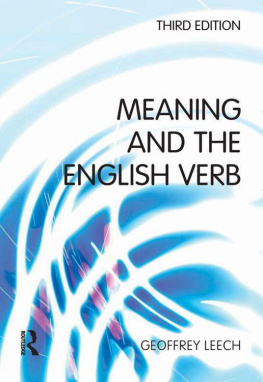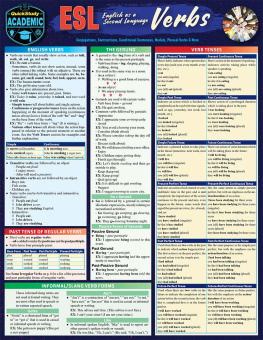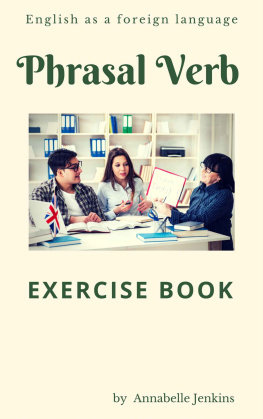Meaning and the English Verb
Meaning and the English Verb
Third Edition
Geoffrey Leech

First published 2004 by Pearson Education Limited
Published 2013 by Routledge
2 Park Square, Milton Park, Abingdon, Oxon OX14 4RN
711 Third Avenue, New York, NY 10017, USA
Routledge is an imprint of the Taylor & Francis Group, an informa business
Copyright 1971, 1987, 2004, Taylor & Francis.
The right of Geoffrey Leech to be identified as author of this work has been asserted by him in accordance with the Copyright, Designs and Patents Act 1988.
All rights reserved. No part of this book may be reprinted or reproduced or utilised in any form or by any electronic, mechanical, or other means, now known or hereafter invented, including photocopying and recording, or in any information storage or retrieval system, without permission in writing from the publishers.
Notices
Knowledge and best practice in this field are constantly changing. As new research and experience broaden our understanding, changes in research methods, professional practices, or medical treatment may become necessary.
Practitioners and researchers must always rely on their own experience and knowledge in evaluating and using any information, methods, compounds, or experiments described herein. In using such information or methods they should be mindful of their own safety and the safety of others, including parties for whom they have a professional responsibility.
To the fullest extent of the law, neither the Publisher nor the authors, contributors, or editors, assume any liability for any injury and/or damage to persons or property as a matter of products liability, negligence or otherwise, or from any use or operation of any methods, products, instructions, or ideas contained in the material herein.
ISBN: 978-0-582-78457-4 (pbk)
British Library Cataloguing-in-Publication Data
A CIP catalogue record for this book can be obtained from the British Library
Library of Congress Cataloging-in-Publication Data
Leech, Geoffrey N.
Meaning and the English verb / Geoffrey Leech. 3rd ed.
p. cm.
Includes bibliographical references and index.
ISBN 0-582-78457-3 (pbk.)
1. English languageVerb. 2. English languageTextbooks for foreign speakers. I. Title.
PE1271.L4 2004
428.24dc22
2004040107
Contents
I am very grateful
- to Valerie Adams for reading through and commenting on the earlier chapters of this book
- to the late Sidney Greenbaum for chapter-by-chapter comments, and for kindly undertaking some research on American English
- to R.A. Close, for a careful reading of the manuscript with a particular eye to the needs of the foreign learner
- to Paul James Portland for detailed observations from the point of view of the speaker of American English
- to Julia Youst and Susan Conrad for kindly helping me in advising on American English for the third edition
- to Nicholas I. Smith for reading and commenting on the third edition of this book, and in advising on the compilation of the Further Reading section. I am also grateful for the help Nicholas Smith has given me during 19992004, in researching recent grammatical change in English, concentrating on the verb
- the Arts and Humanities Research Board and the British Academy, for the funding of the research just mentioned
GNL
Lancaster University, 2004
will:
The bar indicates that the following syllable is stressed.
*It has rained tomorrow:
The asterisk * indicates an unacceptable or non-English piece of language.
?*He is being ill:
The ?* indicates that an utterance is marginally unacceptable.
(have) got to:
The brackets are sometimes used to mark elements that can be omitted.
Simple Present:
The initial capitals indicate a grammatical category.
possibility:
The quotation marks indicate a semantic category or explanation of meaning.
AmE: American English
BrE: British English
It is now over thirty years since the first edition of this book was published in 1971. Like the second edition (1987), this new edition has been thoroughly revised and updated to take account of relevant new research, which has been plentiful in recent years. The book has been thoroughly revised, but those who are familiar with the second or even the first edition will find little difficulty, I believe, in adapting to the changes made in the third edition.
Another kind of updating needed is that of keeping up with a language undergoing change. It is easy to assume that major grammatical areas of the language such as tense, aspect and modality remain the same from one generation to another, or at least change only very slowly. In part, the contrary seems to be the case. In the period 1961 to 1991, from corpus studies undertaken by Nicholas Smith and myself as well as others, it appears that modal auxiliaries and some other constructions have been gradually changing. The modals, except for will and would, decreased significantly in frequency between the 1960s and the 1990s and part of this was apparently due to the decline or obsolescence of certain uses of modals for example, the must of obligation and the may of permission. Conversely semi-modals such as be going to and need to have been increasing in frequency. In spite of evolving usage, there are of course many aspects of the grammar and semantics of the verb which show little or no change since 1971.
It seems strange, but perhaps not unsurprising in view of the above paragraph, that the major changes in this edition are similar in scope and grouping to changes made for the second edition in 1987: they stem particularly from what has been newly learned about modal auxiliaries and comparable constructions. Thus Chapters 14 of the book are comparatively unchanged: there are hundreds of minor changes and additions, there have been many small revisions and some substantial revisions consequential on the new look at the modals. Exemplification has been improved. Hundreds of examples have been replaced or added, many new examples coming from electronic corpuses such as the Freiburg-Lancaster-Oslo/Bergen Corpus of written English (1991), the Freiburg-Brown Corpus of written American English (1992), the Longman Corpus of American Conversation (early 1990s) and the British National Corpus (mainly 1991 3 years), as well as more recent Internet sources. (The dates refer to the years when the corpus data was produced.) Usually the examples from corpus data have been adapted to make them simpler and more suitable for illustrative purposes.
As for section numbering, the first half of the book (up to in the previous edition. The Further Reading section (pp. 1337) has been thoroughly updated and expanded.
Re-reading the book after thirty years with a new critical awareness, I noticed a stodgy, overly academic flavour in many of its sentences, and have taken this opportunity to make the style simpler and more congenial. These stylistic adjustments reflect another way in which the English language has been changing over the generations time-span since this books original publication.
GNL
Lancaster University,
March 2004

See, for example, Leech (2003), Mair and Hundt (1995) and Smith (2001, 2003) in the Further Reading section at the end of the book.
Next page






